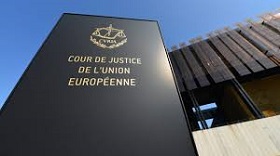Banks, EU – Baltic States, Financial Services, Latvia, Legislation
International Internet Magazine. Baltic States news & analytics
Tuesday, 23.04.2024, 16:17
Latvia has not provided EU Court of Justice with evidence justifying suspension of Rimsevics as Bank of Latvia governor - Attorney General
 Print version
Print version |
|---|
Rimsevics and the ECB brought actions against the Corruption Prevention Bureau's decision to suspend Rimsevics from his job as he was suspected of trading in influence and taking bribes.
The said statute provides that 'a governor may be relieved from office only if he no longer fulfills the conditions required for the performance of his duties or if he has been guilty of serious misconduct'.
As Kokott points out, the EU Justice Court's task is to determine whether a member state which has relieved a governor of its central bank from office has shown to the requisite legal standard that those conditions are met.
The advocate general observes that the measures adopted in the present case in respect of Rimsevics, although temporary, nonetheless constitute being 'relieved from office' within the meaning of the Statute of the ESCB and of the ECB, because, in order for a measure to fall within its scope, that notion concerns not the form of that measure and its status under national law, but its substance and tangible effects. In the present case, the tangible effect of the measures imposed on Rimsevics is that he is prevented from performing his duties as governor of the Bank of Latvia and as member of the Governing Council of the ECB.
Kokott explains that, when such a matter concerning removal from office is brought before it, the EU Justice Court's first task is to classify as a matter of law the acts allegedly committed by the governor concerned, that is, to determine whether those acts are such as to establish that the latter no longer fulfills the conditions required for the performance of his duties or that he has been guilty of serious misconduct. If this should prove to be the case, the court must then go on to examine, in the light of the evidence adduced by the member state concerned, whether the governor in question did in fact commit the acts alleged.
According to Kokott, in the present case, the acts allegedly committed by Rimsevics are - if it is established that they were in fact committed - such as to demonstrate that he no longer fulfills the conditions required for the performance of his duties or that he has been guilty of serious misconduct.
Moreover, Kokott observes that it can be demonstrated that such acts were committed either by means of a ruling on the substance of the case by an independent court of a member state or by evidence capable of demonstrating, of itself, that the alleged acts did take place.
However, as Kokott notes, in the present case, no ruling on the substance of the case has been given by a Latvian court concerning the acts allegedly committed by Rimsevics and nor has the Republic of Latvia produced any other evidence before the EU Justice Court. Latvia merely submitted, inter alia, documents drawn up by administrative authorities concerning Rimsevics' role and his alleged conduct. Although the documents contain a description of the acts allegedly committed by Rimsevics, they do not contain any factual evidence capable of establishing that those acts did in fact take place. There is therefore no evidence before the EU Justice Court that would allow it to ascertain whether the allegations made against Rimsevics are well founded. In those circumstances, the court is not in a position to ascertain whether the conditions set out in the Statute of the ESCB and of the ECB for relieving a Governor of a central bank from office are met.
Kokott therefore concludes that, by relieving Rimsevics from the office of governor of the Bank of Latvia without demonstrating that the conditions set out in the Statute of the ESCB and of the ECB for such removal from office were met, the Republic of Latvia has failed to fulfill its obligations under that provision.
As reported, the Prosecutor General's Office this past summer charged Rimsevics with taking bribes and businessman Maris Martinsons with aiding and abetting the bribing of Rimsevics.








 «The Baltic Course» Is Sold and Stays in Business!
«The Baltic Course» Is Sold and Stays in Business!

